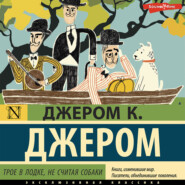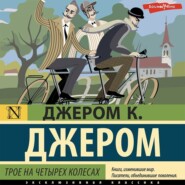По всем вопросам обращайтесь на: info@litportal.ru
(©) 2003-2024.
✖
They and I
Настройки чтения
Размер шрифта
Высота строк
Поля
“What a worrying chap you are!” I said to him. “Look at the thing from the humorous point of view. It’s funny when you come to think of it. Wherever the poor girl goes, trying to peel her potatoes in peace and quietness, we burst in upon her. What we ought to do now is to take a walk in the wood. It is a pretty wood. We might say we had come to pick wild flowers.”
But I could not persuade him. He said he had letters to write, and, if I would allow him, would remain in his room till dinner was ready.
Dick and Veronica came in a little later. Dick had been to see Mr. St. Leonard to arrange about lessons in farming. He said he thought I should like the old man, who wasn’t a bit like a farmer. He had brought Veronica back in one of her good moods, she having met there and fallen in love with a donkey. Dick confided to me that, without committing himself, he had hinted to Veronica that if she would remain good for quite a long while I might be induced to buy it for her. It was a sturdy little animal, and could be made useful. Anyhow, it would give Veronica an object in life – something to strive for – which was just what she wanted. He is a thoughtful lad at times, is Dick.
The dinner was more successful than I had hoped for. Robina gave us melon as a hors d’œuvre, followed by sardines and a fowl, with potatoes and vegetable marrow. Her cooking surprised me. I had warned young Bute that it might be necessary to regard this dinner rather as a joke than as an evening meal, and was prepared myself to extract amusement from it rather than nourishment. My disappointment was agreeable. One can always imagine a comic dinner.
I dined once with a newly married couple who had just returned from their honeymoon. We ought to have sat down at eight o’clock; we sat down instead at half-past ten. The cook had started drinking in the morning; by seven o’clock she was speechless. The wife, giving up hope at a quarter to eight, had cooked the dinner herself. The other guests were sympathised with, but all I got was congratulation.
“He’ll write something so funny about this dinner,” they said.
You might have thought the cook had got drunk on purpose to oblige me. I have never been able to write anything funny about that dinner; it depresses me to this day, merely thinking of it.
We finished up with a cold trifle and some excellent coffee that Robina brewed over a lamp on the table while Dick and Veronica cleared away. It was one of the jolliest little dinners I have ever eaten; and, if Robina’s figures are to be trusted, cost exactly six-and-fourpence for the five of us. There being no servants about, we talked freely and enjoyed ourselves. I began once at a dinner to tell a good story about a Scotchman, when my host silenced me with a look. He is a kindly man, and had heard the story before. He explained to me afterwards, over the walnuts, that his parlourmaid was Scotch and rather touchy. The talk fell into the discussion of Home Rule, and again our host silenced us. It seemed his butler was an Irishman and a violent Parnellite. Some people can talk as though servants were mere machines, but to me they are human beings, and their presence hampers me. I know my guests have not heard the story before, and from one’s own flesh and blood one expects a certain amount of sacrifice. But I feel so sorry for the housemaid who is waiting; she must have heard it a dozen times. I really cannot inflict it upon her again.
After dinner we pushed the table into a corner, and Dick extracted a sort of waltz from Robina’s mandoline. It is years since I danced; but Veronica said she would rather dance with me any day than with some of the “lumps” you were given to drag round by the dancing-mistress. I have half a mind to take it up again. After all, a man is only as old as he feels.
Young Bute, it turned out, was a capital dancer, and could even reverse, which in a room fourteen feet square is of advantage. Robina confided to me after he was gone that while he was dancing she could just tolerate him. I cannot myself see rhyme or reason in Robina’s objection to him. He is not handsome, but he is good-looking, as boys go, and has a pleasant smile. Robina says it is his smile that maddens her. Dick agrees with me that there is sense in him; and Veronica, not given to loose praise, considers his performance of a Red Indian, both dead and alive, the finest piece of acting she has ever encountered. We wound up the evening with a little singing. The extent of Dick’s repertoire surprised me; evidently he has not been so idle at Cambridge as it seemed. Young Bute has a baritone voice of some richness. We remembered at quarter-past eleven that Veronica ought to have gone to bed at eight. We were all of us surprised at the lateness of the hour.
“Why can’t we always live in a cottage and do just as we like? I’m sure it’s much jollier,” Veronica put it to me as I kissed her good night.
“Because we are idiots, most of us, Veronica,” I answered.
CHAPTER V
I started the next morning to call upon St. Leonard. Near to the house I encountered young Hopkins on a horse. He was waving a pitchfork over his head and reciting “The Charge of the Light Brigade.” The horse looked amused. He told me I should find “the gov’nor” up by the stables. St. Leonard is not an “old man.” Dick must have seen him in a bad light. I should describe him as about the prime of life, a little older than myself, but nothing to speak of. Dick was right, however, in saying he was not like a farmer. To begin with, “Hubert St. Leonard” does not sound like a farmer. One can imagine a man with a name like that writing a book about farming, having theories on this subject. But in the ordinary course of nature things would not grow for him. He does not look like a farmer. One cannot say precisely what it is, but there is that about a farmer that tells you he is a farmer. The farmer has a way of leaning over a gate. There are not many ways of leaning over a gate. I have tried all I could think of, but it was never quite the right way. It has to be in the blood. A farmer has a way of standing on one leg and looking at a thing that isn’t there. It sounds simple, but there is knack in it. The farmer is not surprised it is not there. He never expected it to be there. It is one of those things that ought to be, and is not. The farmer’s life is full of such. Suffering reduced to a science is what the farmer stands for. All his life he is the good man struggling against adversity. Nothing his way comes right. This does not seem to be his planet. Providence means well, but she does not understand farming. She is doing her best, he supposes; that she is a born muddler is not her fault. If Providence could only step down for a month or two and take a few lessons in practical farming, things might be better; but this being out of the question there is nothing more to be said. From conversation with farmers one conjures up a picture of Providence as a well-intentioned amateur, put into a position for which she is utterly unsuited.
“Rain,” says Providence, “they are wanting rain. What did I do with that rain?”
She finds the rain and starts it, and is pleased with herself until some Wandering Spirit pauses on his way and asks her sarcastically what she thinks she’s doing.
“Raining,” explains Providence. “They wanted rain – farmers, you know, that sort of people.”
“They won’t want anything for long,” retorts the Spirit. “They’ll be drowned in their beds before you’ve done with them.”
“Don’t say that!” says Providence.
“Well, have a look for yourself if you won’t believe me,” says the Spirit. “You’ve spoilt that harvest again, you’ve ruined all the fruit, and you are rotting even the turnips. Don’t you ever learn by experience?”
“It is so difficult,” says Providence, “to regulate these things just right.”
“So it seems – for you,” retorts the Spirit. “Anyhow, I should not rain any more, if I were you. If you must, at least give them time to build another ark.” And the Wandering Spirit continues on his way.
“The place does look a bit wet, now I come to notice it,” says Providence, peeping down over the edge of her star. “Better turn on the fine weather, I suppose.”
She starts with she calls “set fair,” and feeling now that she is something like a Providence, composes herself for a doze. She is startled out of her sleep by the return of the Wandering Spirit.
“Been down there again?” she asks him pleasantly.
“Just come back,” explains the Wandering Spirit.
“Pretty spot, isn’t it?” says Providence. “Things nice and dry down there now, aren’t they?”
“You’ve hit it,” he answers. “Dry is the word. The rivers are dried up, the wells are dried up, the cattle are dying, the grass is all withered. As for the harvest, there won’t be any harvest for the next two years! Oh, yes, things are dry enough.”
One imagines Providence bursting into tears. “But you suggested yourself a little fine weather.”
“I know I did,” answers the Spirit. “I didn’t suggest a six months’ drought with the thermometer at a hundred and twenty in the shade. Doesn’t seem to me that you’ve got any sense at all.”
“I do wish this job had been given to someone else,” says Providence.
“Yes, and you are not the only one to wish it,” retorts the Spirit unfeelingly.
“I do my best,” urges Providence, wiping her eyes with her wings. “I am not fitted for it.”
“A truer word you never uttered,” retorts the Spirit.
“I try – nobody could try harder,” wails Providence. “Everything I do seems to be wrong.”
“What you want,” says the Spirit, “is less enthusiasm and a little commonsense in place of it. You get excited, and then you lose your head. When you do send rain, ten to one you send it when it isn’t wanted. You keep back your sunshine – just as a duffer at whist keeps back his trumps – until it is no good, and then you deal it out all at once.”
“I’ll try again,” said Providence. “I’ll try quite hard this time.”
“You’ve been trying again,” retorts the Spirit unsympathetically, “ever since I have known you. It is not that you do not try. It is that you have not got the hang of things. Why don’t you get yourself an almanack?”
The Wandering Spirit takes his leave. Providence tells herself she really must get that almanack. She ties a knot in her handkerchief. It is not her fault: she was made like it. She forgets altogether for what reason she tied that knot. Thinks it was to remind her to send frosts in May, or Scotch mists in August. She is not sure which, so sends both. The farmer has ceased even to be angry with her – recognises that affliction and sorrow are good for his immortal soul, and pursues his way in calmness to the Bankruptcy Court.
Hubert St. Leonard, of Windrush Bottom Farm, I found to be a worried-looking gentleman. He taps his weather-glass, and hopes and fears, not knowing as yet that all things have been ordered for his ill. It will be years before his spirit is attuned to that attitude of tranquil despair essential to the farmer: one feels it. He is tall and thin, with a sensitive, mobile face, and a curious trick of taking his head every now and again between his hands, as if to be sure it is still there. When I met him he was on the point of starting for his round, so I walked with him. He told me that he had not always been a farmer. Till a few years ago he had been a stockbroker. But he had always hated his office; and having saved a little, had determined when he came to forty to enjoy the rare luxury of living his own life. I asked him if he found that farming paid. He said:
“As in everything else, it depends upon the price you put upon yourself. Now, as a casual observer, what wage per annum would you say I was worth?”
It was an awkward question.
“You are afraid that if you spoke candidly you would offend me,” he suggested. “Very well. For the purpose of explaining my theory let us take, instead, your own case. I have read all your books, and I like them. Speaking as an admirer, I should estimate you at five hundred a year. You, perhaps, make two thousand, and consider yourself worth five.”
The whimsical smile with which he accompanied the speech disarmed me.
“What we most of us do,” he continued, “is to over-capitalise ourselves. John Smith, honestly worth a hundred a year, claims to be worth two. Result: difficulty of earning dividend, over-work, over-worry, constant fear of being wound up. Now, there is that about your work that suggests to me you would be happier earning five hundred a year than you ever will be earning two thousand. To pay your dividend – to earn your two thousand – you have to do work that brings you no pleasure in the doing. Content with five hundred, you could afford to do only that work that does give you pleasure. This is not a perfect world, we must remember. In the perfect world the thinker would be worth more than the mere jester. In the perfect world the farmer would be worth more than the stockbroker. In making the exchange I had to write myself down. I earn less money, but get more enjoyment out of life. I used to be able to afford champagne, but my liver was always wrong, and I dared not drink it. Now I cannot afford champagne, but I enjoy my beer. That is my theory, that we are all of us entitled to payment according to our market value, neither more nor less. You can take it all in cash. I used to. Or you can take less cash and more fun: that is what I am getting now.”
“It is delightful,” I said, “to meet with a philosopher. One hears about them, of course; but I had got it into my mind they were all dead.”
“People laugh at philosophy,” he said. “I never could understand why. It is the science of living a free, peaceful, happy existence. I would give half my remaining years to be a philosopher.”
“I am not laughing at philosophy,” I said. “I honestly thought you were a philosopher. I judged so from the way you talked.”
“Talked!” he retorted. “Anybody can talk. As you have just said, I talk like a philosopher.”
“But you not only talk,” I insisted, “you behave like a philosopher. Sacrificing your income to the joy of living your own life! It is the act of a philosopher.”

















